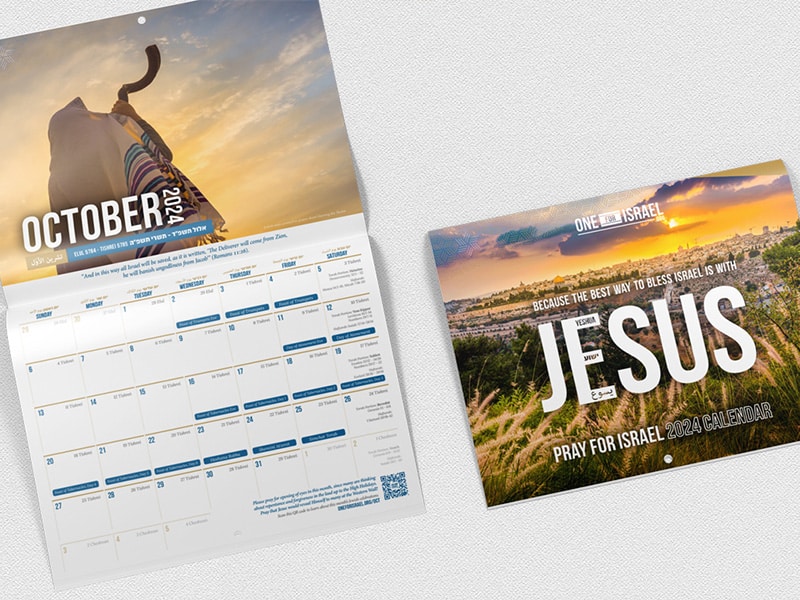We are all very familiar with the famous icon of “the Crucified Jesus”, probably mostly recognized as the symbol of Christianity. But what if we told you that this image of the pierced Messiah is actually a biblical Jewish concept? And what if we told you that there is a prophecy in the Old Testament describing it?
Jesus was crucified on the evening of Passover in Jerusalem with two criminals crucified either side of him. The religious leaders asked to break the legs of the crucified, in order to speed up their death, since they didn’t want their bodies to be left hanging on the cross during the Sabbath. When the soldiers reached Jesus, they saw that he was already dead. In the New Testament, John describes like this: “But one of the soldiers pierced his side with a spear, and at once there came out blood and water” (Jn. 19:34). John indicated that blood and water came out of Jesus as a result of the piercing, although it wasn’t clear why he bothered to mention this. Today, we know that according to physiology, when a person dies, the blood in their body separates into a clear liquid and into red blood cells. This fact proves that that person really is dead. John of course, had no idea why that happened because this scientific knowledge didn’t exist in his time. He described what he saw with his own eyes. In the Old Testament, in Zechariah 12:10, the prophet prophesies:
“And I will pour out on the house of David and the inhabitants of Jerusalem a spirit of grace and pleas for mercy, so that, when they look on me, on him whom they have pierced, they shall mourn for him, as one mourns for an only child, and weep bitterly over him, as one weeps over a firstborn.”
The day will come when God will pour His spirit on the People of Israel, and as a result of this, the People of Israel will look at Him, and will recognize that they pierced Him, and then will mourn as one mourns over the death of a first born son.
A few verses earlier, Zechariah predicts the day on which the State of Israel will be once again in the Land of Israel and will be at the center of interest throughout the world. This will eventually lead all the nations to initiate an attack against her:
“On that day I will make Jerusalem a heavy stone for all the peoples. All who lift it will surely hurt themselves. And all the nations of the earth will gather against it.” (Zech. 12:3)
The end-time prophecy of Zechariah fits our days very well. The people of Israel are once again in the Land of Israel and Jerusalem is at the center of interest and attention in the world. But Zechariah continues to prophecy:
“On that day the LORD will protect the inhabitants of Jerusalem, so that the feeblest among them on that day shall be like David, and the house of David shall be like God, like the angel of the LORD, going before them. And on that day I will seek to destroy all the nations that come against Jerusalem.” (Zech. 12:8-9)
God will intervene, will defend Jerusalem and will destroy the nations that tried to destroy Israel. And then comes the climax:
“And I will pour out on the house of David and the inhabitants of Jerusalem a spirit of grace and pleas for mercy, so that, when they look on me, on him whom they have pierced, they shall mourn for him, as one mourns for an only child, and weep bitterly over him, as one weeps over a firstborn.” (Zech. 12:10)
The people of Jerusalem will know the one whom they have pierced. There’s a fundamental assumption in Zechariah’s prophecy, that until then, the people of Israel didn’t recognize the one they pierced; pierced “to” the cross and pierced on the cross. If that same person is indeed the Messiah, it means that before hand he had a different role, he had to suffer, to be pierced and to die. But after the people of Jerusalem recognize Him and their mistake, they will repent, mourn and weep bitterly as one weeps over a firstborn.
Did you notice the identity of the one who was pierced in Zechariah’s prophecy:
“they look on me, on him whom they have pierced.” (Zech. 12:10)
God is the speaker; God is the one pouring out his spirit, and God is also the one who the people of Israel pierced. Just as rejecting the prophets who were sent by God was the same as rejecting God Himself, piercing the Messiah is like piercing God Himself. God revealed Himself to us as the Messiah, who, as a people, we rejected and pierced. But in His death, He was the sacrifice and the atonement for our sins. And today, more than ever before, many Jews are recognizing Jesus as the Messiah.
In the New Testament, in the prophetic book of Revelation, it quotes Zechariah’s prophecy in exactly the same context, Jesus the Messiah returning and the people of Israel recognizing the Messiah who was pierced and rejected:
“Behold, he is coming with the clouds, and every eye will see him, even those who pierced him, and all tribes of the earth will wail on account of him.” (Rev. 1:7)
Zechariah’s prophecy stresses many rabbis out today, and we have already came across some modern rabbis who were so scared by Zechariah’s description, that they are asking not to attribute it to the Messiah, but to other things, to King Josiah or to a large group. But this is a modern interpretation, which was meant to hide Jesus from you.
Classical Judaism, in contrast to modern rabbis, always interpreted Zechariah’s prophecy about the Messiah, and that He should die. One of the oldest interpretations in the Talmud, attributes the prophecy of Zechariah to Messiah son of Joseph who should die, and who, according to the ancient Jewish tradition, is the suffering Messiah. Why be surprised then, when the New Testament attributes this verse to Jesus, the Messiah who suffered and died for our sins on the cross?
In the Babylonian Talmud it says: “It’s well according to him who explains that the cause (of the mourning) is the slaying of the Messiah the son of Joseph, since that well agrees with the Zechariah 12: ‘And they shall look upon me, whom they have pierced; and shall mourn for him, as one mourneth for his only son.’” (Sukkah 52a)
Rashi in Sukkah 52 interprets Zechariah’s prophecy and says: “And the land shall mourn in Zechariah’s prophecy who prophesied the future when they will mourn over Messiah son of Joseph who was killed…”
Rabbi Moses Alshech adds in this section: “They shall look unto Me, for they shall lift up their eyes unto Me in perfect repentance, when they see Him whom they have pierced, that is Messiah, the Son of Joseph; He will take upon Himself all the guilt of Israel.”
By the way, the Alshech also says that the Messiah take the suffering upon himself willingly: “because he was willing to bare them upon himself… and we thought he will not take them upon himself, he is afflicted, smitten by God. But when the time comes for him to show himself in all his glory, then all will see and understand how big is the power of the sufferer for the generation.”
He based this on Isaiah 53, which is another chapter about the suffering Messiah which we deal with in separate video – another chapter that the rabbis don’t want you to know about














